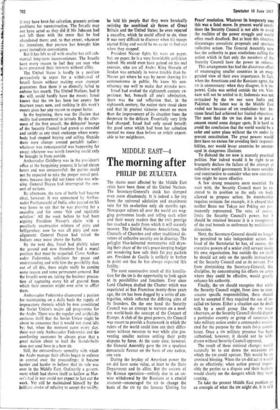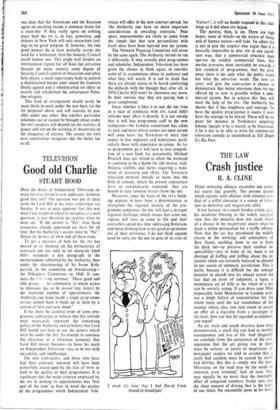The morning after
MIDDLE EAST-4 PHILIP DE ZULUETA
The shares most affected by the Middle East crisis have been those of the United Nations. The Secretary-General's stock has slumped even more disastrously. It is indeed a far cry from the universal adulation and unanimous vote for his re-election only six months ago. Newspaper editors all over the world are wag- ging portentous heads and telling each other and their weary readers that the UN's prestige has reached a nadir from which it will scarcely recover. The United Nations Associations, the Councils of Churches and other traditional de- votees of collective security are in disarray. The polyglot blue-helmeted mercenaries still draw- ing their share of the UN's peace-keeping budget are wondering how safe their fat pay packets are. President de Gaulle is unlikely to bother to point out that he has always expected this futility.
The most constructive result of this humilia- tion for the UN is the opportunity to look again at its possibilities and functions. Ever since Lord Gladwyn drafted the Charter which was negotiated at San Francisco twenty-three years ago, the UN has been dogged by a series of am- biguities, which reflected the differing aims of its founders. On the one hand the Security Council was an attempt to recreate on a mod- ern world-basis the concept of the Concert of Europe. A club of the great powers, the Council was meant to provide a framework in which the rulers of the world could iron out their differ- ences without recourse to war while also pre- venting smaller nations settling their petty disputes by force. At the same time, however, the General Assembly gave the UN a spurious democratic flavour on the basis of one nation, one vote.
During the heyday of American power the IN did have some value, at least to the State Department and its allies. But the success of the Korean operation—entirely due to an un- wise withdrawal by the Russians at a crucial moment—encouraged the us to change the basis of the UN by the famous 'Uniting for Peace' resolution. Whatever its Temporary uses this was a fatal move. In present world condi- tions the Security Council is not able to avoid the realities of the power struggle and would often reach deadlock. But at least this situation discourages unrealistic proposals and spurious collective action. The General Assembly now has the authority to pass resolutions calling for action which in fact only the members of the Security Council have the power to enforce.
This arrangement has had the disastrous effect of encouraging smaller countries in an exag- gerated view of their own importance. In fact, when the Americans and the Russians agree, the UN is unnecessary: when they disagree, it is im- potent Cuba was settled outside the UN, Viet- nam will not be settled in it; Indonesia was not restrained by the UN nor were India and Pakistan; the latest war in the Middle East ended not because of UN resolutions but be- cause Israel had achieved her limited objectives. The most that the UN has done is to put a cocoon round some danger spots. It is hard to avoid the conclusion that the world would be a safer and saner place without the UN under its present constitution. The great powers would then have no excuse for avoiding their responsi- bilities, nor would lesser countries be encour- aged in dangerous illusions.
To disband the UN now is scarcely practical politics. Nor indeed would it be right to so brusquely declare the failure of the attempt at collective world government. It is more sensible and constructive to consider what new constitu- tion might be more effective.
A few strong measures seem essential. To start with, the Security Council must be re- stored to its position as the only UN body • allowed to propose action. Its membership • requires revision: for example, it is absurd that neither Bonn nor Tokyo nor Peking are per- manently represented. The veto, of course. limits the Security Council's power, but it should be retained because it is a recognition of the real bounds to settlement by multilateral discussion.
Next, the Secretary-General should no longer ' be permitted to take independent action. As head of the Secretariat he has, of course, the executive powers of a senior civil servant inside his own organisation, but outside the UN itself he should act only on the specific instructions of the Security Council and as its servant. Far from diminishing the Secretary-General, this discipline, by concentrating his efforts on areas where they could be effective, would greatly enhance his authority.
Finally, the UN should recognise that while the Security Council might, from time to time, assume specific responsibilities, these should not be accepted if they required the use of so- called UN forces. Either a situation can be dealt with by a small group like the UN truce observers, or the Security Council should depute a particular country or group of countries to take military action under a commander nomin- ated for the purpose by the main force contri- butor. Once a urt military presence has been authorised, however, it should not be with- drawn without Security Council approval.
The result of these minimal changes would naturally be to cut down the occasions on which the utq could operate. This would be an unmixed blessing. When the UN did act it would do so effectively; when action proved impos- sible the parties to a dispute and their backers would clearly see the dangers which they were running.. To take the present Middle East position as an example of what the UN might do, it is sUil not clear that the Americans and the Russians agree on anything except a common desire for a cease-fire. If they really agree on nothing more then the UN is, in fact, powerless, and debates in New York will only exacerbate feel- ings to no good purpose. If, however, the two great powers do at least mutually accept the need for a settlement, then the Security Council could impose one. This might well involve an international regime for all Sinai (an attractive thought on many counts), some degree of Security Council control of Jerusalem and other holy places, a small supervisory body to control a demilitarised border zone round the frontiers finally agreed and a wholehearted UN effort to resettle and rehabilitate the unfortunate Pales- tine refugees.
This kind of arrangement would surely be more likely to work under the new basis for the UN proposed above and will scarcely be pos- sible under any other. But whether particular solutions can or cannot be brought about under the UN'S auspices will depend on the realities of power and not on the wording of documents or the eloquence of orators. The sooner the UN'S own constitution recognises this the better for us all.



































 Previous page
Previous page